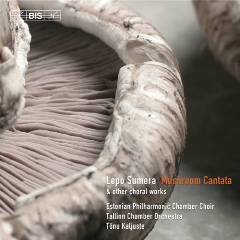Lepo Sumera - Mushroom Cantata & Other Choral Works (2005)
Lepo Sumera - Mushroom Cantata & Other Choral Works (2005)

1. Concerto per voci e strumenti (Concerto for voices and instruments): I. Furioso 3:35 2. Concerto per voci e strumenti (Concerto for voices and instruments): II. Moderato 6:09 3. Concerto per voci e strumenti (Concerto for voices and instruments): III. Allegro misterioso 4:44 4. Kui tume veel kauaks ka sinu maa (Though Your Homeland May Be in Dark For Long) 3:25 5. Seenekantaat (Mushroom Cantata): I. Carmen veris (Spring Song) 6:09 6. Seenekantaat (Mushroom Cantata): II. Timor (Fear) 4:23 7. Seenekantaat (Mushroom Cantata): III. Carmen autumnus (Autumn Song) 5:54 8. Seenekantaat (Mushroom Cantata): IV. Luxuria 4:34 9. Saare piiga laul merest (Island Maiden's Song from the Sea) 29:58 Raivo E. Tamm, actor Jan Uuspõld, actor Pille Lukin, actor Guido Kangur, actor Ülle Kaljuste, actor Külle Teetamm, actor Andero Ermel, actor Janika Lentsius, flute Madis Metsamart, percussion Kadri-Ann Sumera, piano Estonian Philharmonic Chamber Choir Tallin Chamber Orchestra Tõnu Kaljuste, conductor
Lepo Sumera - Estonian composer active in an age of musical and political freedom.
While writers often lead political double lives, composers only very rarely hold public office. The great Polish composer-pianist Ignacy Paderewski is the most celebrated example, having once been his country's prime minister; more recently, the Greek composer Thanos Mikroutsikos has served in the Greek cabinet, while the Estonian Lepo Sumera, who has died of heart failure aged 50, was his country's minister of culture from 1988-92, during the momentous period of independence from the Soviet Union.
Sumera's importance to Estonia extends much further than his tenure of a relatively peripheral political post. After Heino Eller (1887-1970), whose last pupil Sumera was, and Arvo Pärt, Sumera became one of the most internationally renowned composers from his country, his works being taken up by orchestras throughout North America and Europe (though less readily in Britain), and as far afield as Australia and Cuba.
The modern orchestra was, without doubt, his preferred medium for expression, and his six symphonies and three concertos, all written between 1981 and this year, form the backbone of his output. Only last month, his Sixth Symphony was premiered in a concert to mark his 50th birthday, as, indeed, was another new work, the Concerto Grosso, a week earlier.
It has been suggested that the intensity of his involvement in preparing both scores for performance may have undermined his frail medical condition; he had a history of cardiac problems, and had undergone an exploratory operation some years earlier.
Sumera's music passed through a variety of styles over the years, in the 1970s employing a free form of Schoenberg's 12-note method, as well as collage. Later, he evolved an idiom that, in common with the music of many of his compatriots, seems to embrace minimalism, but the roots for which lay not in any American model, such as Philip Glass or Steve Reich, but rather in the ancient runic songs of Estonia.
Sumera first came to notice in 1972 with In Memoriam, his orchestral tribute to Eller. This work proved prophetic in its atmospheric orchestration and invigorating blend of various musical styles, features of later works such as the Third Symphony (1988). The five movements of his Fourth Symphony, Serena Borealis (1992), separately cover a wide range of moods - from calm quietude to unbridled ferocity; the Fifth (1995), written in one, half-hour-long movement, synthesised the disparate elements of his works of the previous decade into one of his most impressive works.
That Sumera also had an acute ear for instrumental sonority can be heard plainly in his brooding and intense Piano Concerto (1989, revised in 1997) and Cello Concerto (1999), as well as in earlier works - such as Music For Chamber Orchestra (1977), with its enchanting flute solos, or the solo piano Piece From The Year 1981. His output also includes much chamber music, as well as cantatas, more than 50 film scores, and a multi-media opera, Olivia's Master Class (1997), in which paintings by one of the characters are displayed via video.
In the late 1980s, Sumera became increasingly interested in electro-acoustic music, eventually founding, in 1995, the Electronic Music Studio at the Estonian Academy of Music. In 1999, his electro-acoustic work, Heart Affairs, used sounds made by the human heart - transformed electronically during performance - as well as echocardiographic images, including those of his own heart. He is credited with being the first Estonian composer to use a computer systematically for composition.
Sumera first studied music with the composer and musicologist Veljo Tormis (whose choral music has also begun, in recent years, to have considerable international appeal), moving in 1968 to Eller's class at the then Tallinn Conservatory (now the Estonian Academy of Music). He completed his studies with Heino Jürisalu, graduating in 1973, by which time he was already working as recording director for Estonian radio, a post he relinquished in 1980 after starting a two-year postgraduate course at Moscow Conservatory.
Sumera began teaching composition at the Estonian Academy in 1978, and was appointed profesor in 1993. His most renowned former pupil is Erkki-Sven Tüür, who delivered the oration at his funeral. He also served as chairman of the Estonian Composers' Union from 1993.
In 1972, he married the pianist Kersti Einasto, who survives him, and with whom he had two daughters, Kadri-Ann and Eva-Maria, and a son, Tammo. Guy Rickards
Lepo Sumera, composer and teacher, born May 8 1950; died June 2 2000. --- theguardian.com
download: uploaded filecloudio anonfiles yandex 4shared mediafire solidfiles mega nornar








